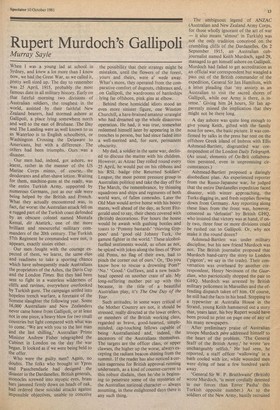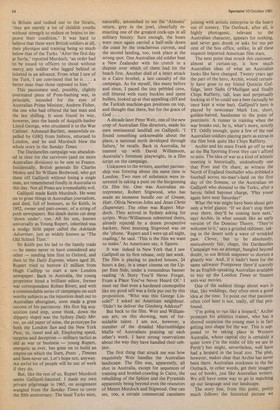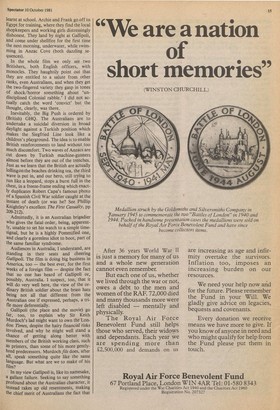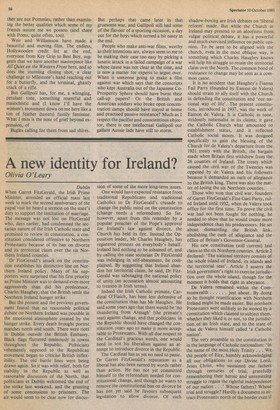Rupert Murdoch's Gallipoli
Murray Sayle
When I was a young lad at school in Sydney, and knew a lot more than I know now, we had the Great War, as we called it, pretty well sized up. The day to remember was 25 April, 1915, probably the most famous date in all military history. Early on that fateful morning two divisions of Australian soldiers, the toughest in the world, assisted by their faithful New Zealand bearers, had stormed ashore at Gallipoli, a place lying somewhere north and well to the east of Brisbane. The Day and The Landing were as well known to us as Waterloo is to English schoolboys, or Washington Crossing the Delaware to Americans, but with a difference. The others had been triumphs. Ours was a disaster.
Our men had, indeed, got ashore, we learnt, rather in the manner of the US Marine Corps minus, of course, the deodorants and after-shave lotion. Waiting for them, machine-guns at the ready, was the entire Turkish Army, supported by numerous Germans, just as our side were being helped by the British and French. What they actually encountered was, in fact, far worse: the Australian attack fell on a rugged part of the Turkish coast defended by an obscure colonel named Mustafa Kemal, dit Atattirk, one of the more brilliant and resourceful millitary commanders of the 20th century. The Turkish 57th Regiment he commanded were not, it appears, exactly sissies either.
Our men fought with the courage expected of them, we learnt, the same elan and readiness to take a sporting chance which have subsequently made Australians the proprietors of the Ashes, the Davis Cup and the London Times. But they had been sent to fight in a waterless wilderness of cliffs and ravines, everywhere overlooked by Turkish guns. The campaign settled into hopeless trench warfare, a foretaste of the Somme slaughter the following year. Some 16,000 Australians and New Zealanders never came home from Gallipoli, or at least not in one piece, a heavy blow for two small countries but light compared with what was to come. 'We are with you to the last man and the last shilling,' Australian Prime Minister Andrew Fisher telegraphed the Cabinet in London on the day the war began. It looked as if we were being held to the offer.
Who were the guilty. men? Again, no doubts. The folks who brought us Ypres and Passchendaele had designed the disaster in the Dardanelles. British generals, monocles screwed into myopic eyes, brass hats jammed firmly down on heads of oak, had ordered these suicidal attacks against Impossible objectives, unable to conceive the possibility that their strategy might be mistaken, until the flowers of the forest, yours and theirs, were a' wede away. What's more, they operated from the comparative comfort of dugouts, châteaux and, on Gallipoli, the wardrooms of battleships lying far offshore, pink gins at elbow.
Behind these homicidal idiots stood an even more sinister figure, one Winston Churchill, a hare-brained amateur strategist who had dreamed up the whole disastrous operation. He had, it was true, somewhat redeemed himself later by appearing in the trenches in person, but had since faded into a well-merited and, for sure, permanent obscurity.
My dad, a soldier in the same war, declined to discuss the matter with his children. However, as Anzac Day rolled round every 25 April, he would put on his ribbons and his RSL badge (the Returned Soldiers' League, the most potent pressure group in Australian politics) and take the day off for The March, the remembrance, by thinning squadrons and ships and regiments of both world wars, of fallen comrades. Later the Old Man would arrive home with his boozy mates, well ahead of the day, as Scott Fitzgerald used to say, their chests covered with (British) decorations. For hours the house would be awash with gushing bottles and toasts to 'Pommy bastards' thieving Gyppoes' and 'good old Johnny Turk, the gamest fighter in the world.' These alcoholfuelled sentiments would, as often as not, be spiced with jokes along the lines of 'Poor old Poms, no flag of their own, had to pinch the corner out of ours.' Or, `Do you know how to rescue a drowning Porn?' 'No.' Good.' Guffaws, and a new beachhead opened on another crate of ale. My long-suffering mother put up with this because, in the title of a beautiful Australian play, it's The One Day of the Year.
Such attitudes, in some ways critical of the Mother Country are not, it should be stressed, really directed at the lower orders, or members of the British working class, regarded as brave, good-hearted, simpleminded, cap-touching fellows capable of being Australianised and, indeed, the ancestors of the Australians themselves. The targets are the officer class, or upper clawses, the higher up the worse, always excepting the radiant beacon shining from the summit. If the reader has also noticed a certain eagerness for British approval running underneath, as a kind of counter-current to this robust disdain, then he/she is beginning to penetrate some of the mysteries of the Australian national character — always assuming, in these enlightened days there is any such thing. The ambiguous legend of ANZAC (Australian and New Zealand Army Corps, for those wholly ignorant of the art of war — it also means 'almost' in Turkish) was not the only tradition conceived on the crumbling cliffs of the Dardanelles. On 2 September 1915, an Australian cubjournalist named Keith Murdoch, aged 29, managed to get himself ashore on Gallipoli. Murdoch had failed to get accreditation as an official war correspondent but wangled a pass out of the British commander of the expedition, General Sir Ian Hamilton, with a letter pleading that 'my anxiety as an Australian to visit the sacred shores of Gallipoli, while our Army is there, is intense.' Giving him 24 hours, Sir Ian apparently missed the implication that they might not be there long.
A day ashore was quite long enough to give young Keith, gifted with the family nose for news, the basic picture. It was confirmed by talks in the press bar tent on the offshore Greek island of lmbros with Ellis Ashmead-Bartlett, disgruntled war correspondent of the London Daily Telegraph. (As usual, elements of Oz-Brit collaboration persisted, even in unpromising circumstances.) Ashmead-Bartlett proposed a daringly disobedient plan. An experienced reporter from the Russo-Japanese war, he judged that the entire Dardanelles expedition faced disaster, with winter approaching, the Turks digging in, and fresh supplies flowing down from Germany. Any reporting along these lines from the front was, however, censored as 'defeatist' by British GHQ, who insisted that victory was at hand, if only two, three four or more divisions could be rushed out to Gallipoli. Or, why not make it the round dozen?
Ashmead-Bartlett was under military discipline, but his new friend Murdoch was not. The British journalist proposed that Murdoch hand-carry the story to London ('pigeon', we say in the trade). Their conversation was overheard by another correspondent, Henry Nevinson of the Guardian, who patriotically shopped the pair to GHQ. Murdoch was arrested by British military policemen in Marseilles and the offending dispatch taken off him. Of course, he still had the facts in his head. Stepping to a typewriter at Australia House in the Strand, young Keith hammered out a story that, years later, his boy Rupert would have been proud to print on page one of any of his many newspapers.
After preliminary praise of Australian troops Murdoch pere addressed himself to the heart of the problem. 'The General Staff of the British Army,' he wrote 'are unchangeably selfish.' He had seen, he reported, a staff officer 'wallowing' in a bath cooled with ice, while wounded men were dying of heat a few hundred yards away.
'General Sir W. P. Braithwaite' (British) wrote Murdoch, 'is more cordially detested in our forces than Enver Pasha' (his Turkish opposite number.) As to the soldiers of the New Army, hastily recruited in Britain and rushed out to the Straits, `they are merely a lot of childish youths without strength to endure or brains to improve their condition.' It was hard to believe that these were British soldiers at all, their physique and training being so much below that of the Turks. `After the first day at Suvla,' reported Murdoch, 'an order had to be issued to officers to shoot without mercy any soldier who lagged behind or loitered in an advance. From what I saw of the Turk, I am convinced that he is . . . a better man than those opposed to him.'
This passionate and, possibly, slightly overstated piece of Porn-bashing was, in principle, intended for the eyes of Australian Prime Minister, Andrew Fisher, the one who had offered the last man and the last shilling. It soon found its way, however, into the hands of Asquith-basher Lloyd George, who circulated it to the War Cabinet. Ashmead-Bartlett, meanwhile expelled by GHQ from Imbros, returned to London, and he and Murdoch blew the whole story in the Sunday Times.
The Dardanelles campaign was abandoned in time for the survivors (and six more Australian divisions) to be sent to France. Incidentally, British generals Sir Charles Monro and Sir William Birdwood, who got them off Gallipoli without losing a single man, are remembered fondly in Australia to this day. Not all Poms are irremediably evil.
Gallipoli made Keith Murdoch. He went on to great things in Australian journalism, and died, full of honours, as Sir Keith, in 1952, owner and part-owner, of a string of posh newspapers. But death duties cut deep 'down under', too. All his son, known universally as Young Rupert, inherited was a stodgy little paper called the Adelaide Advertiser, just as widely known as 'The Old School Tizer.'
Sir Keith put his lad to the family trade — he seems never to have considered any other — sending him first to Oxford, and then to the Daily Express, where aged 20, Rupert tried to borrow El million from Hugh Cudlipp to start a new London newspaper. Back in Australia, the young proprietor hired a brilliant editor, former war correspondent Rohan Rivett, and with a commendable series of campaigns on such worthy subjects as the injustices dealt out to Australian aborigines, soon made a great success of his patrimony. His first big acquisition (and step, some think, down the slippery slope) was the Sydney Daily Mirror, an old paper of mine, the prototype for both the London Sun and the New York Post, tit, tinsel and all. Employing speed, surprise and deception — military tactics as old as war or business — young Rupert, energetic as ever, has gone on to build an empire on which the Stars, Posts , Timeses and Suns never set. Let's hope not, anyway. An awful lot of people will be out of work if they do.
But, like the rest of us, Rupert Murdoch seems Gallipoli-haunted. I made my own private pilgrimage in 1965, on assignment wangled from the Sunday Times to cover the 50th anniversary. The local Turks were, naturally, astonished to see the 'Almosts' return, grey in the jowl, cheerfully reenacting one of the greatest cock-ups in all military history. Sure enough, the boats were once again carried a half-mile down the coast by the treacherous current, and the second landing, too, took place at the wrong spot. One Australian old soldier beat a New Zealander with his crutch in a dispute over which of them had hit the beach first. Another died of a heart attack in a Cairo brothel, a late casualty of the campaign. As for myself, like many before and since, I paced the tiny pebbled cove, still littered with rusty buckles and spent bullets, looked up at that appalling cliff and the Turkish machine-gun positions on top, and thought that there, but for the grace of God . . .
A decade later Peter Weir, one of the new crop of Australian film directors, made his own sentimental landfall on Gallipoli. 'I found something unknowable about the place, a national myth developed through failure,' he recalls. Back in Australia, he teamed up with David Williamson, Australia's foremost playwright, in a film script on the campaign.
Unknown to the writers, another partnership was forming about the same time in London. Two men of substance were interested in taking a punt on the burgeoning Oz film biz. One was Australian entrepreneur, Robert Stigwood, who has made an immense bundle out of Grease, Hair, Olivia Newton-John and Jesus Christ (Superstar). The other was Rupert Murdoch. They arrived in Sydney asking for scripts. Weir/Williamson submitted theirs, already rejected by a dozen prospective backers. Next morning Stigwood was on the 'phone. 'Rupert and I were up all night, reading,' he said. 'This is the film we want to make.' As Americans say, it figures.
It was indeed in New York that I saw Gallipoli on its first release, only last week. The film is playing to packed houses, 24 hours a day, in a smart cinema on the Upper East Side, under a tremendous banner reading 'A Story You'll Never Forget, From a Place You've Never Heard Of.' I must say that even a hardened cosmopolite like my good self was a little put out by this proposition. 'Who was this George Lincoln?' I asked an American neighbour. 'Didn't he deliver the Ginsberg Address?'
But back to the film. Weir and Williamson are, on this showing, men of formidable talent. I am not, however, a member of the dreaded Murrumbidgee Mafia of Australians praising up each other's work. I have strong reservations about the way they have handled their subject.
The first thing that struck me was how exquisitely Weir handles the Australian landscape. The film was, apparently, all shot in Australia, except for sequences of training and brothel-crawling in Cairo, the rebuilding of the Sphinx and the Pyramids apparently being beyond even the resources of Messrs Murdoch and Stigwood. One can see, too, a certain commercial canniness joining with artistic enterprise in the heavy use of scenery. The Outback, after all, is highly photogenic, relevant to the Australian character, appears for nothing, and never gets drunk or asks for ten per cent of the box office, unlike, in all these respects imported American film stars.
The next point that struck this customer, almost at curtain-up, is how much Australian ideas of what an Australian looks like have changed. Twenty years ago the part of the hero, Archie, would certainly have gone to my friend Quentin Goffidge, later Slabs O'Mulligan and finally Chips Rafferty, tall, lean and perpetually looking as if he could use a beer (actually he once kept a wine bar). Gallipoli's hero is played by newcomer Mark Lee, short, golden-haired, handsome to the point of prettiness. A runner in training when the war breaks out, he is, what's more, strictly TT. Oddly enough, quite a few of the real Australian soldiers playing parts as extras in the film look quite like Chips Rafferty.
Archie and his mate Frank go off to war as the Big Sporting Event they can't afford to miss. The idea of war as a kind of athletic meeting is historically, undoubtedly one that Porn and Oz share, as witness the North of England footballer who dribbled a football across no-man's-land on the first day of the Somme, or the Australian on Gallipoli who shouted to the Turks, after a heroic failed bayonet charge, 'Play youse again here next Saturday!'
What the war might have been about gets only a brief glance. 'If we don't stop them over there, they'll be coming here next,' says Archie, in what sounds like an early version of the Domino Theory. 'They're welcome to it,' says a grizzled oldtimer, taking in the desert with a wave of wrinkled paw. Clever, but to be absolutely, meticulously fair, chaps, the Dardanelles Campaign was an attempt, bungled beyond doubt, to use British seapower to shorten a ghastly war. And, if it hadn't been for the same saltwater Pompower there'd scarcely be an English-speaking Australian available to buy up the London Times or finance anti-war movies.
One of the saddest things about wars is that, like weddings, they often seem a good idea at the time. To point out that passions often cool later is not, really, all that profound.
'I'm going to run like a leopard,' Archie promises his athletics trainer, who has a shrewd suspicion the young man is in fact getting into shape for the war. This is supposed to be taking place in Western Australia, whose capital city is certainly a quiet town ('in the midst of life we are in Perth') but might, nevertheless, well have had a leopard in the local zoo. The plot, however, makes clear that Archie has never been there. Australian stockmen in the far Outback, in other words, get their imagery out of books, just like Australian writers. We still have some way to go in matching up our language and our landscape.
The story line, from this point, pretty much follows the historical picture we learnt at school. Archie and Frank go off to Egypt for training, where they find the local Shopkeepers and working girls distressingly dishonest. They land by night at Gallipoli, and come under shellfire for the first time the next morning, underwater, while swimming in Anzac Cove (both dazzling sequences).
In the whole film we only see two Britishers, both English officers, with monocles. They haughtily point out that they are entitled to a salute from other ranks, even Australians, and when they get the two-fingered variety they gasp in tones of shock/horror something about 'undisciplined Colonial rabble.' I did not actually catch the word 'convict' but the thought, clearly, was there.
Inevitably, the Big Push is ordered by (British) GHQ. The Australians are to undertake a suicidal diversion in broad daylight against a Turkish position which makes the Siegfried Line look like a children's playground. The idea is to enable British reinforcements to land without too much discomfort. Two waves of Anzacs are cut down by Turkish machine-gunners almost before they are out of the trenches. Just as we learn that the British are actually lollingon the beaches drinking tea, the third wave is put in, and our hero, still trying to run like a leopard, stops a burst full in the chest, in a freeze-frame ending which exactly duplicates Robert Capa's famous photo Of a Spanish Civil War soldier caught at the instant of death (or was he? See Phillip Knightley's excellent The First Casualty, pp 209-212).
Admittedly, it is an Australian brigadier who gives the fatal order, being, apparently, unable to set his watch to a simple timesignal, but he is a highly Pommified one, and clearly a gormless idiot to boot, part of the same familiar syndrome.
Audiences in Australia, I understand, are standing in their seats and cheering Gallipoli. The film is doing big business in America, too — the best ever, for the first weeks of a foreign film — despite the fact that no one has heard of Gallipoli or, Possibly, Australia. I suspect, too, that it Will do very well here, the view of the ordinary British soldier about the brass hats being not all that different from the Australian one if expressed, perhaps, a trifle more deferentially.
Gallipoli (the place and the movie) go far, too, to explain why Sir Keith Murdoch's lad might want to own the London Times, despite the hairy financial risks Involved, and why he might well stand a Chance of getting along better with members of the British working class, such as printers, than some of his more gentlybred predecessors. Murdoch fits does, after all, speak something quite like the same language. But what are we to make of his film?
In my view Gallipoli is, like its namesake, a gallant failure. Seeking to say something Profound about the Australian character, it Instead rakes up old resentments, making the chief merit of Australians the fact that they are not Pommies, rather than examining the better qualities which some of my friends assure me we possess (and share with Poms, quite often, too).
Weir and Williamson have made a beautiful and moving film. The endless, Hollywooden credit list at the end, everyone from Key Grip to Best Boy, suggests that we have another masterpiece like All Quiet on the Western Front here, and so does the stunning closing shot, a clear challenge to Milestone's hand reaching out for a butterfly, and the terminal, ghastly crack of a rifle.
But Gallipoli has, for me, a whinging, petulant tone, something resentful and masochistic and (I know I'll have the women's movement down on me here like a ton of feather dusters) fussily feminine. What I miss is the note of grief beyond expression, of Bugles calling for them from sad shires.. But perhaps that came later in that gruesome war, and Gallipoli still had some of the flavour of a sporting occasion, a day out for the boys which turned a bit nasty in the end.
People who make anti-war films, worthy as their intentions are, always seem to me to be making their case too easy by picking a lunatic attack in a failed campaign of a war whose cause was not clear at the time, and is now a matter for experts to argue over. When is someone going to make a film against war which says that the conscripts who kept Australia out of the Japanese CoProsperity Sphere should have burnt their call-up papers? Or the British and American soldiers who broke open concentration camps should have stayed at home and practised passive resistance? Much as I respect the pacifist and conscientious objector, there is one intellectual Gallipoli our gallant Aussie lads have still to storm.









































 Previous page
Previous page